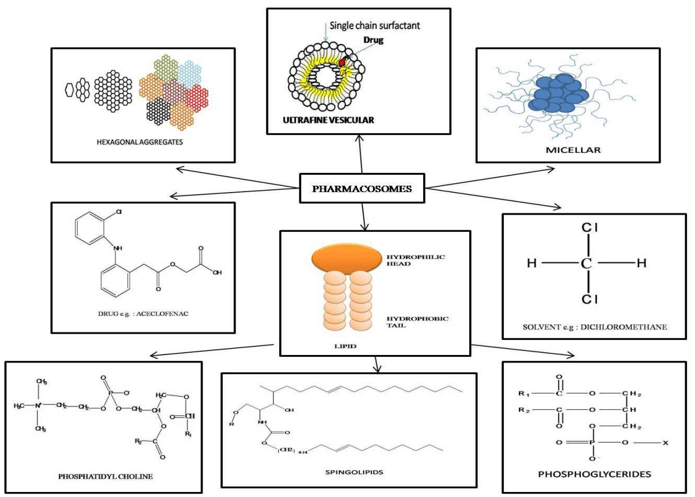Pharmacosomes Production
Leading the rapid development of novel vesicular drug delivery systems, Creative Biostructure builds up several advanced technology platforms for liposome production, including the pharmacosome technology, specifically for poorly soluble drug delivery. Based on the specialized knowledge and efficient pipelines, we can customize the production service according to your demands.
How Pharmacosomes Work
Instead of physically trapping drugs into vesicles, amphiphilic phospholipids in pharmacosomes are complexed with drugs via hydrogen bonds between active hydrogens and phospholipids. The drug molecule bearing an active hydrogen atom (-COOH, -OH, -NH2 etc.) can be converted to an ester with the hydroxyl moiety of the lipid, resulting in an amphiphilic complex that aids membrane, tissue, or cell wall transfer. The drug-lipid complex exists as a monomer at low concentrations, but a variety of structures (e.g. micelles, colloidal or hexagonal shape) might develop when the concentration increases. Eventually, the conjugated drug will be released from pharmacosomes upon chemical or enzymatic hydrolysis. Compared to other liposomal drug delivery systems, pharmacosomes have advantages such as minimized drug degradation and increased drug bioavailability. For example, limitations in transfersomes such as predisposition to oxidative degradation and impurity of natural phospholipids can be overcome by pharmacosomes. Besides, other advantages are also beneficial in various research:
- No drug leakage due to the covalently link.
- High entrapment efficiency.
- Suitable for both hydrophilic and lipophilic drugs.
- Improved bioavailability especially in case of poorly soluble drugs.
- No need to remove unentrapped drugs from the formulation as needed in case of liposomes.
- Reduction in adverse effects, toxicity, and the cost of therapy.
- Avoid drug incorporation in the body of the patient.
- Membrane fluidity does not affect drug release.
 Figure 1. Forms and components of pharmacosomes. (International Journal of Pharmaceutical Research & Allied Sciences, 2014)
Figure 1. Forms and components of pharmacosomes. (International Journal of Pharmaceutical Research & Allied Sciences, 2014)
Pharmacosomes Applications
Pharmacosomes have been developed to enhance the solubility for both hydrophilic and lipophilic drugs, including non-steroidal anti-inflammatory drugs, proteins, cardiovascular and antineoplastic drugs. Pharmacosomes can be administered via oral, topically, or through extravascular and intravascular routes.
According to their amphiphilic nature, we can also design and synthesize suitable lipids to complex with desirable drugs. In addition, we have extensive experience in the selection of solvents and formulations for final products. We offer first-in-class services for pharmacosome preparation. Meanwhile, in-house precise assays are available to evaluate their characteristics:
- Complex Determination: Fourier-transform infrared spectroscopy (FTIR)
- Surface Morphology: Scanning electron microscopy (SEM) or Transmission electron microscopy (TEM)
- Solubility studies: shake –flask techniques
- Determine the drug-excipients compatibility or interactions: Differential scanning calorimetry (DSC)
- In vivo and in vitro drug release evaluations
Relying on our powerful technical platforms, Creative Biostructure persists in providing trustworthy service to support your research on drug delivery development. We are glad to serve scientists worldwide. Please contact us to share details of your service request.
Ordering Process
References
- Archana Pandita, Pooja Sharma, (2013) Pharmacosomes: an emerging novel vesicular drug delivery system for poorly soluble synthetic and herbal drugs. ISRN Pharmaceutics. 348186.
- Ujjwala Bhingare, S.S.Khadabadi, Nita Shinde. (2014) Pharmacosomes: a novel drug delivery system. International Journal of Pharmaceutical Research & Allied Sciences. 3: 14-20.
- Ali Gamal Ahmed Al-kaf, Ahmad Mohammed Othman. (2017) A review on pharmacosomes: an emerging novel vesicular drug delivery system. Universal Journal of Pharmaceutical Research. 2: 21-24.
